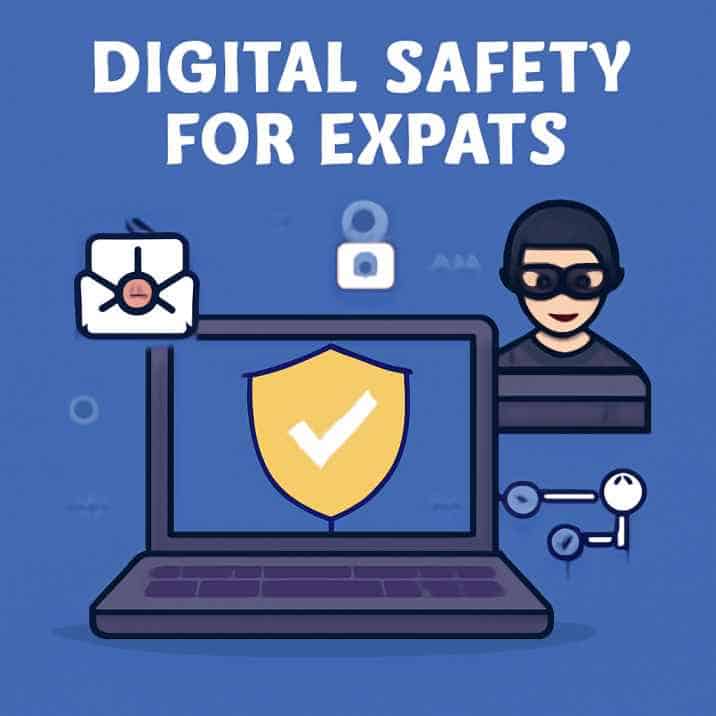
As an expat, embracing digital technologies to manage your finances, communicate, and navigate your new life is essential. However, the rise of online activities also brings an increased risk of cyber scams. Whether you’re managing online banking, shopping, or simply keeping in touch with family, it’s crucial to understand how to protect yourself from cyber threats. This blog will guide you through the best practices for ensuring your digital safety as an expat.
Common Cyber Scams Targeting Expats
-
Phishing Attacks
-
Fraudulent emails or messages that appear to come from legitimate sources, such as banks or government agencies, aiming to steal your personal information.
-
Look out for suspicious links, urgent language, or unfamiliar senders.
-
-
Identity Theft
-
Cybercriminals can use personal information obtained through hacks or phishing to steal your identity and gain access to your financial accounts.
-
Ensure that your passwords are strong and unique for each account.
-
-
Online Shopping Scams
-
Fake online stores or deals that appear too good to be true, often targeting expats who are unfamiliar with local sellers.
-
Always check reviews, verify the legitimacy of online retailers, and use secure payment methods.
-
-
Wi-Fi Spoofing
-
Cybercriminals can set up fake Wi-Fi networks to intercept your data, particularly in public spaces like cafes, airports, or hotels.
-
Avoid using unsecured Wi-Fi networks for sensitive activities like banking or shopping.
-
Best Practices for Digital Safety
-
Use Strong Passwords and Two-Factor Authentication
-
Protect your accounts with strong, unique passwords and enable two-factor authentication (2FA) wherever possible for an added layer of security.
-
-
Be Cautious with Emails and Links
-
Do not click on suspicious links in emails or messages, especially those requesting sensitive information or offering unrealistic deals.
-
-
Use a Virtual Private Network (VPN)
-
A VPN helps protect your online activity by encrypting your data, especially when accessing public Wi-Fi networks. This is vital for protecting your privacy and securing sensitive information.
-
-
Regularly Monitor Bank and Credit Accounts
-
Keep an eye on your bank and credit card statements for any unauthorized transactions. Early detection can help prevent further damage.
-
-
Update Your Devices and Software
-
Ensure your operating systems, antivirus software, and apps are updated regularly to fix security vulnerabilities and protect against new threats.
-
How to Report and Respond to Cyber Scams
-
Report the Scam to Local Authorities
-
Depending on your country of residence, report the scam to local authorities or government organizations that specialize in cybercrime.
-
-
Notify Your Bank or Credit Card Provider
-
If financial information has been compromised, immediately inform your bank or credit card provider to freeze your accounts and prevent further fraud.
-
-
Use Cybersecurity Tools
-
Invest in cybersecurity tools, such as antivirus software, to protect your devices from malicious attacks and viruses.
-
Conclusion
As an expat, staying safe online is just as important as staying safe in your physical environment. By following these digital safety practices and staying vigilant, you can protect yourself from cyber scams and enjoy your international experience without the worry of digital threats.


